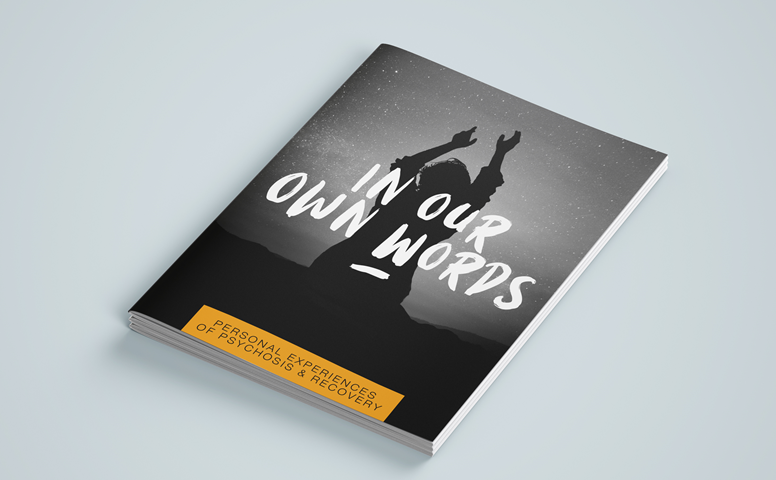Innovations in Peer Support Storytelling from Chris Kinsella, Expert by Experience
Hi Chris, can you tell us a bit about yourself?
I am a trainee Therapeutic Counsellor based in North Derbyshire. In addition, I provide peer support with the Early Intervention in Psychosis Service based at Chesterfield. I also speak at relevant mental health forums and design related outreach materials. More recently, I became an ‘Expert By Experience’ with the PPN. I have a few hats!
Before this, I worked for many years as a creative strategist in advertising and public relations. My career change was prompted partly by the fantastic support I received through clinical psychotherapy following a psychotic break around three years ago. I found it inspirational.
Thanks Chris - Can you tell us how you became interested in peer support?
As I came to the end of my treatment, I discussed ideas of getting involved with the care team. The experience of psychosis was a roller-coaster filled with extreme highs and lows that are difficult to relate to without 'living' it. After recovery, I processed more clearly the events and felt that this awareness could benefit others.
My care coordinator put me in touch with another ex-service user and two occupational therapists within the team. Between us, we set up a talking service where we share experiences and provide support. These sessions usually last an hour or so, and we have up to five sessions with each client. They typically happen between hospital discharge and therapy, providing much-needed support whilst the client is on a waiting list.
The content of the sessions can cover many topics. Subjects include thoughts, medication experiences, attitudes toward therapy, recovery tactics, and on occasion, existential, spiritual and humanistic experiences. The Peer Support volunteers receive regular supervision and training, and we meet as a team to discuss and share approaches to listening and talking.
How does storytelling fit with the service?
Our team had a strong co-creation ethos and wanted to explore how we could innovate in psychosis using lived experience. One of the critical insights we identified was how clients feel alienated and choose not to be open about their thoughts. Often for fear of being further pathologised or recommitted. Feelings of intense loneliness and hopelessness can follow.
The experience of psychosis is often extraordinary and feels unique, yet underlying narrative patterns are often shared between clients. These patterns might include persecution by secretive, malign or 'demonic' forces to feelings of sublime spirituality and god-like powers. A recovered client can identify and offer relatable perspectives on these events to build trust and expression in clients. This is how peer storytelling has an impact. The client can form a connection with a peer by hearing or reading about their similarities in history, background or narrative. Once within a relationship of greater trust, the peer can better bridge the connection between service and client whilst providing authentic understanding and alternative perspectives on recovery and wellness.
As a team, we started to see storytelling as having benefits beyond our one-to-one conversations; we imagined that by reading a relevant story, a client would be more likely to open up to care staff and see the benefits of talking to a peer. We came up with the idea of a printed booklet, ‘In Our Own Words - Lived Experiences of Psychosis and Recovery’.

Can you tell us more about the booklet?
In Our Own Words contains a collection of personal stories, poetry and art created by service users. In addition, there is further information, contact numbers, plus a glossary of some of the common terms associated with psychosis and mental health care. Care coordinators give out the booklet to new service clients and a leaflet about peer support.
We also provide the stories individually so that if a staff member sees similarities in experience or background, they can direct the client to a more relatable account. For example, we have narratives about postpartum psychosis, specific religious and identity contexts, or recreational drug abuse.
The booklet fits into a more comprehensive contact strategy that includes training, post-session feedback and further peer support recruitment. We are seeing great results, both quantifiable and anecdotal. I would say that the grassroots and co-created approach was vital for the service to succeed. Also, the management team's non-directive yet highly professional approach allowed us to grow organically and effectively.
How do you relate this activity to the PPN?
I think the PPN forms an excellent platform for knowledge sharing, shaping education, and consequently, incorporating lived experience into therapeutic contexts - it's what interested me in getting involved with the organisation. To this end, I hope some members find this article interesting and look for ways to incorporate lived experience perspectives into their activities.
One of the key drivers to the service's success was having a few key individuals wanting to get involved in the first place - there is often unknown potential locked up in organisations, waiting to be released! Often, reaching out can trigger interest enough to spark new approaches. Maybe someone reading this could be the start of that process? I hope so.
Where can we find out more?
I recently co-hosted a webinar as part of the Midlands Early Intervention in Psychosis Forum. The presentation details how we co-created the service and is not limited to psychosis - it could benefit anyone interested in wider mental health conditions, peer support and lived experience applications.
A video is available on the NHS futures website: https://future.nhs.uk/MidlandsMHLDA/view?objectId=35171856
Please follow this link to download a PDF of pdf In Our Own Words (1.73 MB)
The PPN Midlands would like to thank Chris for his continued support within the network and for sharing the fantastic work he is doing.
